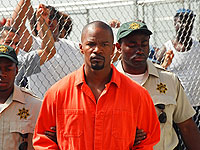 by Flemming Funch by Flemming Funch
Stanley "Tookie" Williams was executed in St.Quentin last night. He was the founder of the Crips gang, and was convicted for having killed 4 people, even though he claimed his innocence. I can't judge whether he actually did it or not. But it is a shame because he seemed to be a reformed man who had become a great activist. The most stirring comment I read is from Doc Searls who just happened to be staying in a house overlooking St.Quentin at the time. Governor Schwarzenegger had denied clemency to Williams, in part for these reasons: The dedication of Williams' book "Life in Prison" casts significant doubt on his personal redemption. This book was published in 1998, several years after Williams¹ claimed redemptive experience. Specifically, the book is dedicated to "Nelson Mandela, Angela Davis, Malcolm X, Assata Shakur, Geronimo Ji Jaga Pratt, Ramona Africa, John Africa, Leonard Peltier, Dhoruba Al-Mujahid, George Jackson, Mumia Abu-Jamal, and the countless other men, women, and youths who have to endure the hellish oppression of living behind bars." The mix of individuals on this list is curious. Most have violent pasts and some have been convicted of committing heinous murders, including the killing of law enforcement.
But the inclusion of George Jackson on this list defies reason and is a significant indicator that Williams is not reformed and that he still sees violence and lawlessness as a legitimate means to address societal problems.
There is also little mention or atonement in his writings and his plea for clemency of the countless murders committed by the Crips following the lifestyle Williams once espoused. The senseless killing that has ruined many families, particularly in African-American communities, in the name of the Crips and gang warfare is a tragedy of our modern culture. One would expect more explicit and direct reference to this byproduct of his former lifestyle in Williams¹ writings and apology for this tragedy, but it exists only through innuendo and inference.
Is Williams' redemption complete and sincere, or is it just a hollow promise? Stanley Williams insists he is innocent, and that he will not and should not apologize or otherwise atone for the murders of the four victims in this case. Without an apology and atonement for these senseless and brutal killings there can be no redemption. In this case, the one thing that would be the clearest indication of complete remorse and full redemption is the one thing Williams will not do. And here's Doc's comment: I haven't read any of Williams' books. I don't know if he has redeemed himself. And I am not a lawyer.
But it seems to me the governor is making a political judgement here, and not just a legal one; especially in respect to George Jackson, a charismatic Black Panther considered by many a martyr after he was shot in prison.
I would find the governor's clemency denial much easier to take if he had confined his remarks to the facts of the case, and said Williams should die, as the courts ordered, for the cold-blooded murder of four people. But he didn't. He gave Williams a fatal book review.
And a shallow one at that. Did the governor read past the dedications? He's right. That's outrageous. Sent a man to his death because he mentioned a black panther favorably in the credits of his book. A fatal book review indeed.
|
|
 by Flemming Funch
by Flemming Funch